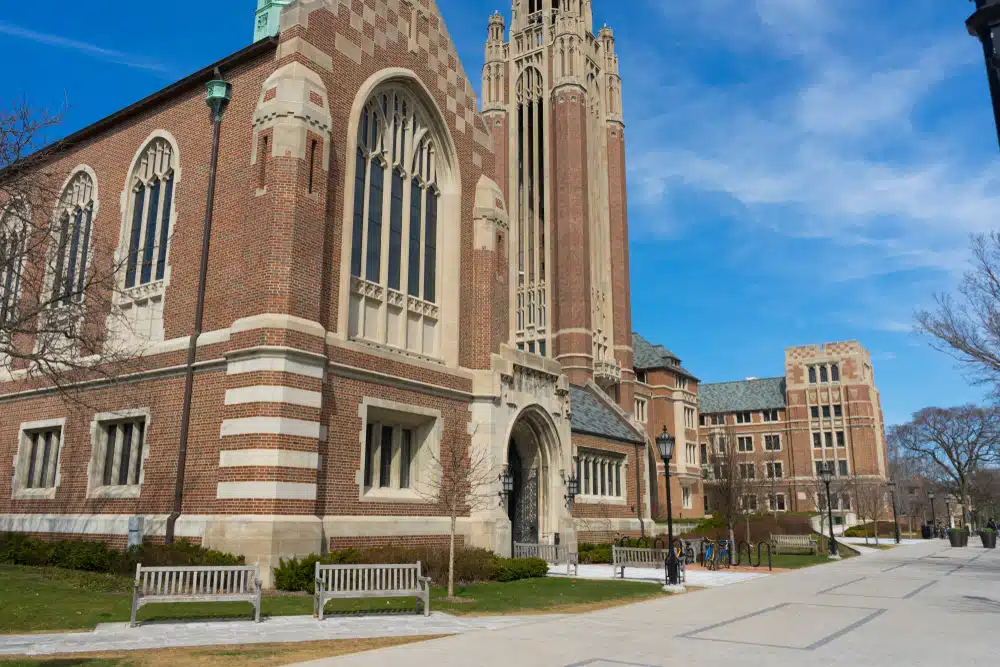UChicago Legacy Acceptance Rate
Does UChicago Consider Legacies?
Several of the nation’s most prestigious educational institutions have begun to reevaluate the weight that is given to an applicant’s legacy status — that is, whether or not any of the applicant’s relatives are graduates of the institution in question — in the admissions decision-making process. In this article, we will be examining the UChicago legacy acceptance rate and how legacy plays a role in your application to the University of Chicago.
Does UChicago consider legacies? The University of Chicago continues to take a candidate’s legacy status into consideration when making admissions decisions, despite the persistent calls to eliminate legacy admissions at prestigious universities.
The director of the UChicago To&Through Project, Alex Seeskin, believes that legacy admissions are beneficial for students who already have an advantage when it comes to applying to college. Seeskin has previous experience working at the UChicago Charter School as the director of strategy and as a resident at the UChicago Impact organization.
“When we give legacy students an extra advantage in the admissions process, we’re benefitting and advantaging students who already have an advantage in this process that was given to them as a result of the means which they were born into,” Seeskin said in an interview with The Maroon.
What Counts As A Legacy At UChicago?
What counts as a legacy at UChicago? Generally speaking, you are considered a legacy at a school if either or both of your parents earned their degrees from that institution. It is important to keep in mind, however, that the undergraduate admissions offices will be most interested in you if either or both of your parents attended that particular school for their undergraduate degrees.
The potential impact on your admissions chances is significantly different depending on whether you apply to a university from which, for example, your Great Aunt Merle graduated in 1912 or to a school that either or both of your parents attended. The former option gives you a better chance of being accepted than the latter.
You are considered to be a “secondary legacy” if you have a tenuous link to the family, such as a great-aunt Merle, a grandparent, or a sibling, and this may be of some assistance to you during the application process. You are considered to be a “main legacy” if you have a direct parental link. Your chances of getting accepted into the program can be significantly improved by having this designation.
What Percent of UChicago Students Are Legacies?
Legacy applicants have a higher chance of being accepted compared to other applicants, but acceptance rates overall are extremely low, at least at highly selective educational institutions. Because of this, an increased acceptance rate may mean that legacy students have a 15% chance of being accepted, whilst general applicants only have an 8% chance.
Although around three-quarters of applicants meet the minimum academic requirements, only about sixty percent of those who submit an application have a legitimate shot at being accepted due to considerations that go beyond simple academic performance. Children who come from illustrious families have a higher chance of belonging to this more select group, and the greater acceptance rate of these students reflects this fact.
Now, what percent of UChicago students are legacies? While UChicago legacy acceptance rate is not made public, about 5.44% of applicants were accepted in the previous admission cycle. UChicago and other institutions assert that legacy status does not offer applicants a meaningful advantage.
For the Class of 2026 admissions, there were 37,522 applications received, and there were 2,041 students accepted, which corresponds to an acceptance rate of 5.44 percent. This suggests that roughly five applicants out of every one hundred submit their resumes for consideration. This illustrates that the university has a very high standard of competition and that the application process is just as challenging.
Though we can say the UChicago legacy acceptance rate is going to be three to four times higher than the regular admissions rate, still, the university is highly selective and uses a holistic assessment.
Students must achieve a high level of success in both their academics and extracurricular activities in order to be considered. They have to ensure that they are gifted in the areas that are required in order to be accepted into this elite university.
Does Being A Legacy Help At UChicago?
Does being a legacy help at UChicago? Legacy preferences are still widely held, although they wield significantly less sway than they once did. Since the 1970s, when the Supreme Court abolished racial quotas in college admissions, several schools and universities have established a process for college admissions that they label “holistic assessment.”
This strategy seeks to take into account kids in their larger social and cultural environments by taking into account a diverse set of characteristics such as academic record, test scores, extracurricular activities, race and ethnicity, and legacy status.
Several of the nation’s most prestigious educational institutions have begun to reevaluate the weight that is given to an applicant’s legacy status — that is, whether or not any of the applicant’s relatives are graduates of the institution in question — in the admissions decision-making process. This is happening in response to growing calls for increased racial and class equity in the college admissions process.
Some Common Errors in Regarding the Legacy Status
- Believing that your legacy status will compensate for a lackluster academic record. Students who are not likely to be successful will not be accepted to highly selective colleges and universities, regardless of whether or not they come from a legacy family. Legacy status is typically taken into consideration by admissions officers when deciding between two applicants who are otherwise similarly competent. In these kinds of situations, the applicant with the heritage will frequently have some kind of advantage. However, this does not necessarily imply that universities will not reduce the admissions bar significantly for legacy applicants who come from notable and/or highly rich families.
- Drawing attention to a tenuous link to the college by using the “Additional Information” part of The Common Application. If there is important information that is not reflected in your application, you should communicate it with the admissions committee through the extra information area of The Common Application. You may use this section to convey intriguing information about yourself that doesn’t fit anywhere else on the application, or you could use it to explain extenuating circumstances that may have affected your grades. Your application could be strengthened with the inclusion of this kind of material. The fact that your great-great-grandfather went to this particular prestigious university is not very significant, and it is unnecessary to provide extra information because it is not an efficient use of that opportunity.
- Placing an excessive amount of importance on your legacy standing. You do not need to bring any further attention to your legacy status beyond the simple act of naming other members of your family who attended the college or university. You and your accomplishments alone should be highlighted in your application; not those of a parent or sibling should take precedence.
The legacy status of a candidate is completely out of people’s control, and it makes no difference whatsoever to the applicant’s overall quality.
There are certain institutions that don’t consider legacy status at all, and even for the colleges that do, legacy status is only a minor consideration in the admissions process. Colleges are aware that having legacy status is a somewhat questionable distinction. When a college or university uses a holistic admissions process, some components of the application will almost always carry greater weight than legacy status.
To begin, you will need to demonstrate that you have a solid track record in the classroom. If you do not have it, you have a very low chance of being accepted into the program, regardless of whether or not you are a legacy. Scores on the Scholastic Aptitude Test (SAT) and the American College Testing Program (ACT) are going to be crucial unless the institution does not require students to take the tests.
In addition to a substantial extracurricular activity, favorable letters of recommendation, and an application essay that stands out from the crowd, selective universities will look for these things. Legacy status won’t make up for severe deficiencies in any of these areas.
How Important Are Legacy College Admissions?
How important are legacy college admissions? The first factor is financial, and when asked about legacy acceptance rates, institutions almost always cite this as the reason why they choose to admit students with legacy status. There are a lot of colleges that depend on donations from alumni in order to fund research, scholarships, and other special programs.
Tradition and culture are other reasons why schools give preference to legacy admissions. Schools that value their traditions highly will give legacies a higher priority so that they can pass on their culture to students who are attending for the first time.
For example, Notre Dame places a strong emphasis on school culture and mythology. Of all the top schools, Notre Dame admits the highest percentage of students with family connections. Students at Notre Dame should be mindful of their heritage and interested in learning about their ancestors’ experiences.
Last but not least, the yield rate is another reason why institutions prioritize legacy admissions. When compiling their college rankings, US News & Worl Report takes into consideration several factors, one of which is an institution’s yield or the percentage of its admitted students who go on to enroll there.
Children who come from a family with a history of attending that school are significantly more likely than students from other families to rank that institution as their top choice. To give you a concrete example, students admitted to the UChicago legacy acceptance rate has a much better chance of actually attending the school.
When considered as a whole, these characteristics present universities with powerful incentives to give preference to legacy applicants within a class.
The directive to accept legacies originates at the very top of the institution, with the presidents and trustees in control of the fundraising. Therefore, while it is the responsibility of admissions officers to deal with the nitty-gritty details of college admissions decisions, presidents, deans, and boards of directors are the ones who determine the overarching policies regarding who is admitted and what a college is looking for in its students.
Then, how do departments responsible for admissions deal with legacy students? There are a variety of strategies, but tagging and secondary review are two popular approaches. Students who apply to the university as legacies will have a notation added to their profiles indicating this fact, and it will be taken into consideration along with the other factors. It is unknown how much weight and consideration each college gives to these pupils; however, it is apparent that, in many instances, they are taken into account.
Secondary review is a process that is used not just for legacy students but also for individuals who the school has decided to be worthy of recruiting and admitting. This is typically reserved for legacy students, children of faculty members, and students who are the first in their families to attend college. However, certain colleges may decide on a case-by-case basis that other students are deserving of this privilege.
After the admissions decisions for all of the other applicants have been essentially finalized and these pupils have previously been given a preliminary reading and review, they are read through and evaluated once more in the context of the entire class.
Because of this, there is no guarantee that any particular candidate in this review pile will have a better probability of being accepted; nonetheless, those who are moved on to the secondary review have a better likelihood of admission in comparison to their peers overall.
The University of Chicago is a famous institution that is well-known for graduating students who go on to have great careers. Be careful to get a head start on your application if you want to give yourself the greatest possible opportunity of being accepted. You may check the overall acceptance rates, demographics, UChicago legacy acceptance rate, and other statistical data the university releases to have an idea of what kind of students UChicago looks for. Pay close attention to the specifics, and make sure not to miss any of the due dates.
In general, the University of Chicago is a competitive institution to get admission into. You can, however, improve your chances of getting into this famous school by devoting sufficient amounts of time and effort to the application process and adequately preparing yourself.
AdmissionSight has been assisting students for more than ten years in their journey to college admissions. Now that you have learned about the UChicago legacy acceptance rate, it’s time to start preparing even without the benefits of legacy. Begin with booking an initial consultation with AdmissionSight experts and discuss your way to your dream college.










































